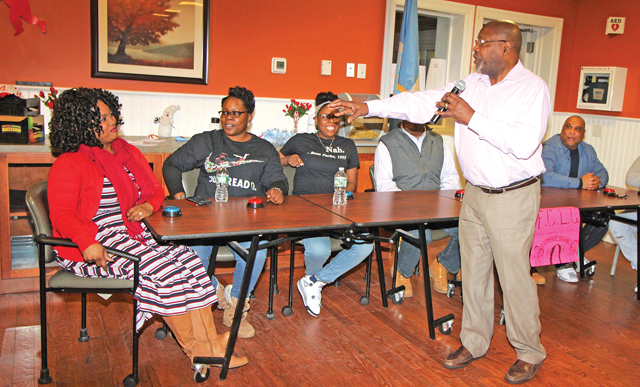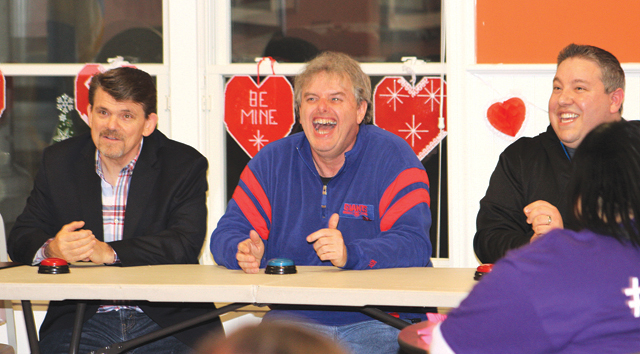Brought together by a history of being torn apart


Last Saturday, The Butterfly Effect Project, a nonprofit group that aims to empower young girls, held its first Intergenerational Black History Bowl in Flanders.
The goal of the quiz show-type event, organizers said, was “to bring awareness, diversity and good old-fashioned fun into the homes and the community.”
There were to have been 10 teams of 10 people, each of whom paid $10, competing in a contest on black history, both local and national, as well as things like sports and entertainment.
The winning team would get $1,000 to donate to the charity of its choice.
The very funny Tia Fulford, founder of The Butterfly Effect Project, served as moderator, keeping everyone laughing and even making several costume changes throughout the night.
To avoid having people embarrass themselves too much, there was a multi-page study guide with all the questions and answers that contestants could read beforehand. A lot of the contestants clearly had the study guide memorized, answering questions before they were even asked, it seemed.
I went as a spectator, but I thought if any of the teams needed a player, I could volunteer, because it looked like a lot of fun.

As it turned out, several teams that had planned to compete didn’t show due to weather, although they did pay the $100 fee, according to Ms. Fulford.
So there were only four teams, representing the Family Community Life Center, Truth Community Church in Flanders, The Butterfly Effect Project and the Flanders, Riverhead and Northampton Community Association.
I found a spot on the FRNCA team.
Unless the questions were really easy, I planned to let other people answer them.
First question, asked by Ms. Fulford: “Who is the superintendent of the Riverhead School District?”
Oooh! I know that! I hit the buzzer.
“Dr. Henriquez,” I answered.
“First name?” Ms. Fulford asked.
“Uhhhhhh,” I mumbled, before remembering “Aurelia.”
“Too late, the three seconds are up. Answer is wrong.”
That meant the other team, Truth Community Church, got to answer questions — and they didn’t get any wrong, meaning we lost the round.
Later, I asked my teammates: If I hadn’t gotten that first question wrong, would we have gotten all the rest of them right?
Yes, they said.
So anyway, the FRNCA team finished last, thanks in large part to me, and the team from Family Community Life Center — which the First Baptist Church of Riverhead has been planning for years — ultimately got the $1,000.
Glad I could help.
[aesop_gallery id=”85838″ revealfx=”off”]
More important, the event lived up to its billing. Everyone had fun, there were people of various backgrounds and age groups getting along, having fun.
The next day, I was channel-surfing and there was an interesting program called “America in Color.”
Basically, the show had old black and white news clips from the 1920s to the 1960s that they colorized.
I caught the episodes from the 1950s and 1960s, and there were a lot of segments about some of the same civil rights events that figured in questions in the Black History Bowl.
There was, for instance, the issue in Alabama where the Supreme Court ordered the schools desegregated and Alabama didn’t want to comply.
In it, there was a clip of a little white girl saying, “I wouldn’t mind going to school with them, but if you go to school with them, then they are going to start coming to our dances and things like that, and I wouldn’t want that.”
The little white girl next to her said she’d rather the school be closed than integrated.
And then there were the Freedom Rides from 1961, where a group of black and white people planned a peaceful demonstration to see if a Supreme Court ruling that banned segregation in interstate travel was being enforced in the South. They planned to ride a bus from Washington, D.C., to New Orleans, but when they got to Alabama, they were greeted by Ku Klux Klan members who slashed the bus tires and then fire-bombed it, with the people inside.
I thought, “Is this the same country I live in?” Or more specifically, the one I was in the previous night, where people of all backgrounds were all getting along and having fun?
I used to think of racism as being a thing from the past. But once the internet — and anonymous comments posted with stories — was invented, I could see that I was wrong.
Hopefully, the Tia Fulfords of the world will continue to do things like the Black History Bowl, that bring people together, not split them apart.
Photo caption: Robert Brown introduces members of the Family Community Life Center team of First Baptist Church of Riverhead at the Butterfly Effect Project’s first Intergenerational Black History Bowl Saturday. Credit: Elizabeth Wagner









